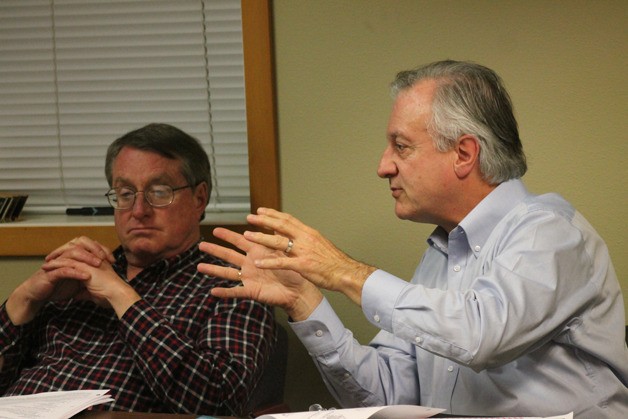Protecting existing businesses will take precedence for Langley with its food truck ordinance.
The city council asked Director of Community Planning Michael Davolio to amend the ordinance at Tuesday’s council meeting to include some kind of seasonal restriction. Previously, Davolio had considered a summer season permit between Memorial Day and Labor Day, from late May to early September.
Councilwoman Rene Neff posited eliminating the slower months when “everybody is struggling” such as January and February, while still allowing food trucks to roll into town for special events, such as the Sea Float Scramble or Mystery Weekend.
A prospective food truck owner, who currently works as a chef at Prima Bistro in Langley, agreed that the first few months of the year are slower for restaurants in the city.
“From their standpoint, I understand why they’re trying to implement a seasonal thing in a small town,” said Chris Vulk, who hopes to launch the Farm-to-Truck food truck this spring. “During the offseason, like it is right now, it’s a lot slower.”
Vulk and his food truck partners want to take their rolling business to areas other than Langley, though the Village by the Sea will make an ideal location during summer, he said. He also suggested that allowing food trucks during the weekends of every month could be beneficial. With more tourists in town, setting up next to the sidewalks could make for booming business.
“For me, I want to move around to different spots,” Vulk said. “Langley’s going to be a big part of that because a lot of people come in during the summer.”
“This isn’t going to be a part-time business for us,” he added. “It’s going to be a full-time business.”
Councilman Bruce Allen also asked to include an exclusion from the identified food truck zones during Choochokam Arts Festival, of which he is a board member.
Only one city council member questioned the fairness of issuing licenses to food trucks but restricting their months of operation. Councilman Thomas Gill, who said some of his friends run food trucks in Portland, Oregon, said he was concerned with including a restriction of food trucks during an event like Choochokam, especially if the trucks were on private property.
Finding ways to make sure the city gets adequately compensated for a food truck’s use of a city parking space was raised by Davolio. He said that the city should not allow a food truck to have a license and use parking because it would be a business using public space for private gain. Mayor Fred McCarthy later added that the city is looking at per day fees or incorporating those costs into the originally proposed $100 per year food truck license.
“To just let a cart be on a parking space wouldn’t be appropriate,” McCarthy said. “A business owner has to lease their property or rent it. There should be some sort of cost with occupying the space.”
As it exists now, the new food truck ordinance draft specifies that with permission of a private property owner, a food truck may set up within city limits if it has its necessary county health documents and a city license.
The council voted to move the ordinance to a second reading, which was not an approval of the final ordinance.



